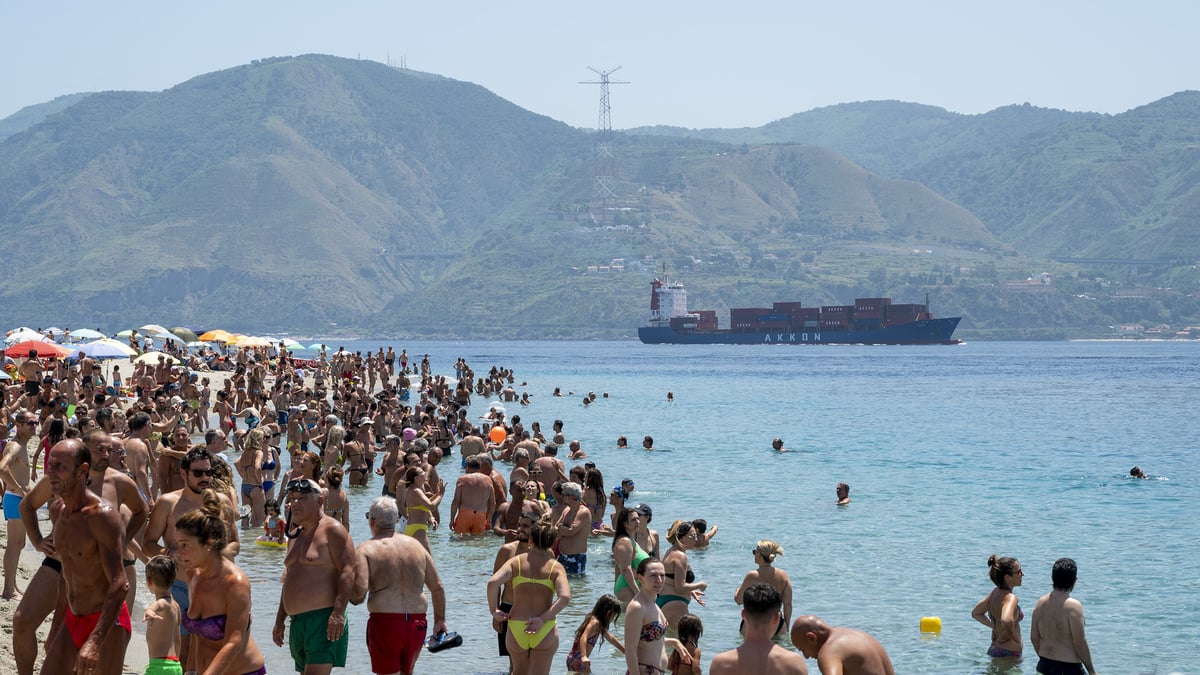‘It’s hotter than it is in Africa’: Ahead of heat peaks expected from Tuesday, the mercury rose again on Sunday in Italy, undeterred by tourists who flocked to beaches, museums and ancient sites.
• Also read: “We’re Dying”: In the Face of the Heat, Texas Workers’ Alarming Cry
• Also read: The “extremely dangerous” heat wave is suffocating the United States
• Also read: on video | Watch how animals deal with extreme heat
16 major Italian cities were put on red alert from the heatwave on Sunday, including Bologna, Florence, Rome and Cagliari in Sardinia and Palermo and Catania in Sicily, with readings in the shade expected around 35/36C, but temperatures approaching 40.
Rome was sweltered by the scorching sun and a high of 34°C was recorded at 1:30pm (6:30am ET).
In the capital’s zoo, keepers have begun to feed the animals frozen fruits to cool them: here a hippopotamus devours quarters of a watermelon, and there are lemurs with thick fur that also lick thirst-quenching fruit.
In the Vatican, crowds of pilgrims and tourists brave the heat wave every day to enter the city-state’s most prestigious museums. According to the Vatican’s gendarmerie, they numbered 15,000, who gathered Sunday morning in St. Peter’s Square to listen to Pope Francis at noon to recite the traditional Angels’ Prayer from the window of his apartment, according to Agence France-Presse correspondents.
Equipped with hats, umbrellas or parasols, they fanned themselves as best they could and hydrated themselves by emptying small bottles of fresh water sold by street vendors.
But for the monks draped in their black robes, the ordeal is getting more difficult.
“It is difficult to adapt, it is much hotter than in Africa, in the Democratic Republic of the Congo,” confirmed François Mbemba, a 29-year-old priest in the Diocese of Kinji near Kinshasa.
“This heat lasts into the night, and we have trouble sleeping. Those of us who are dressed in black, we sweat like hell.”
“I’m really struggling with the heat. I bought a small fan, an umbrella and two bottles of water,” said Lilo da Costa Rosa, a 48-year-old Brazilian saleswoman from Leon.
“The queues are so long, and being in the sun for 35 minutes at 35C is huge. We’ll do it more at the end of the day, it will be cooler.”
Don’t panic for Elias and Carol, who are Lebanese. It is also hot in their country at this time of the year.
“The temperature is almost the same, we put on more sunscreen, drink a little water,” Carol said. “We didn’t think it would be 42 or 43 degrees Celsius [prévus mardi à Rome]But we saw on Google that it was going to be hot,” explained the 36-year-old nurse.
On Lampedusa, an Italian island about 145 kilometers from the Tunisian coast where thousands of migrants land each year, the Red Cross, which has been running the “hotspot” (reception center) since June, “is extending shade in the areas with the help of Non-governmental agency AFP.
Lampedusa is one of the main entry points for migrants crossing the Mediterranean. Last year, more than 46,000 people arrived there, out of a total of 105,000 arrivals in Italy, according to the United Nations High Commissioner for Refugees.
The Italian Meteorological Center (CMI) says it fears “the hottest heat wave of the summer, but also one of the most intense heat waves ever”.
In Rome, which has been renamed the “hellish city” in the press, temperatures could climb to 40°C on Monday, then 42 or 43°C on Tuesday, breaking the previous record of 40.5°C set in the capital in August 2007.
But in Sardinia we expect the highest temperatures. Thus, the record of 48.8°C dated August 11, 2021, which is the highest temperature ever measured in Europe, can be beaten.
The World Meteorological Organization recently stated that heat is one of the deadliest weather events. Last summer, high temperatures in Europe alone caused more than 60,000 deaths, according to a recent study.

“Total coffee aficionado. Travel buff. Music ninja. Bacon nerd. Beeraholic.”







More Stories
Trump impeachment: After scandals, email addresses and shell companies | Donald Trump faces justice
Presidential 2024 | Biden is ready to discuss with Trump
Ukraine: Two dead in territories occupied by Moscow and Russia